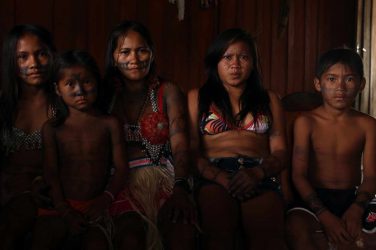For a farmer in Brazil’s Amazon, Manoel Freire Camurca was doing pretty well for himself until a local power broker burned down his house and took the surrounding fields he had poured his life into.
Camurca’s eviction eight months ago happened as officials were finalizing his claim to 500 hectares of land in southwestern Amazonas state where he had spent nearly three decades growing corn, sugar and beans.
“I lost everything,” 61-year-old Camurca said, wiping away tears.
“I went into town and when I came back everything was burned and destroyed.”
Half a dozen other small farmers in his village suffered the same fate after a large rancher said he was the rightful owner of the land.
Camurca’s story highlights an increasingly violent environment in parts of rural Brazil which government officials say is fueled by unclear property title deeds, local corruption and a system where competing state agencies work on land regularization.
Death in the Countryside
At least 36 people died in land conflicts in the first five months of this year, according to the Brazil-based Pastoral Land Commission watchdog.
One government official said 2017 had so far been the most violent year for land fights this century.
“Land conflicts in the Amazon have gotten worse,” said Ronaldo Santos, an official with the National Institute of Colonization and Agrarian Reform (INCRA), a government body responsible for managing and demarcating rural land.
“Big farm operators have the power to dispense injustice,” Santos said following a public meeting with hundreds of angry farmers embroiled in land conflicts in Amazonas in northwestern Brazil.
“We have assassinations and death in the countryside.”
Conflicting Titles
Recent violence has led officials from different government agencies and privately owned land registration agents known as cartórios to trade blame over who is responsible for the conflicts.
Across Brazil, land must be registered by cartórios. They maintain property records and transfer deeds in specific regions. There is no single, centralized system for checking who owns what nationwide.
Inherited from Portuguese colonialists, the cartório system is confusing and widely abused by wealthy land owners, government officials noted.
They said unclear property ownership makes it easier for large ranchers to displace small farmers like Camurca.
“The cartórios hold the biggest responsibility for legalizing grilagem (land grabs),” said Miguel Emile, a senior official with Terra Legal, a government program for regularizing small farmers’ land titles in the Amazon.
There are an estimated 5 million landless families in Brazil, according to a 2016 Canadian study. Government officials say they are working to speed-up property allocations for the rural poor who often live on land they do not formally own.
But even lands demarcated and distributed by government officials from INCRA and Terra Legal must be registered at private cartórios to be fully legal, Emile said.
Small farmers often cannot afford cartório services, he said, and the system itself faces widespread abuse.
Wealthy ranchers can bribe cartórios to register someone else’s land, Emile said.
A common scam involves elites legally buying a small piece of property and then having a cartório register a far larger surrounding area in their name, he said.
As a result of this type of fraud in Pará, a neighboring Amazon state, four times more land has been privately registered than the state’s total area, said Jeremy Campbell, an expert on land rights in Brazil at Roger Williams University in the United States.
Trading Blame
Cartórios, however, say they are not responsible for most of the problem, blaming government agencies for weak Amazon property rights and the resulting violence.
“Grilagem is not done by cartórios,” said one cartório in Amazonas who spoke on condition of anonymity.
His office, which is responsible for maintaining local land records, is full of yellowed, time-worn books of property deeds, along with some digitized documents.
Corruption in government agencies, including INCRA, is a major driver of land scams, the cartório said, as property owners can bribe officials to hand them swaths of state land.
The government is moving to geocode new property registrations so the land is digitally registered through satellite maps but this process has been slow, he added.
Proving Ownership
Forced evictions in Camurca’s village of Bom Lugar in Boca do Acre municipality exemplify the problems with Brazil’s rural property system.
INCRA had provided Camurca with a certification of possession, known locally as a “posse title”. But the farmer said he couldn’t register this as a formal title with a cartório as the process of property demarcation had not been finalized.
This meant that despite a government agency granting Camurca rights to the land where he had lived since 1988 he still did not formally own it.
The rancher who Camurca says was behind the burning of his house could not be reached for comment.
The federal prosecutor for Amazonas state said he was investigating house burnings and displacement across Boca do Acre.
Amazonas senior security official, Sergio Fontes, said the violence affecting Camurca and thousands of others across Brazil’s largest state was due to poor management by officials.
“INCRA should resolve the farmers’ disputes with ranchers before distributing lands, otherwise all these problems happen,” Fontes said.
“(Officials) have to take responsibility for who was placed there.”
This article was produced by the Thomson Reuters Foundation. Visit them at http://www.thisisplace.org














